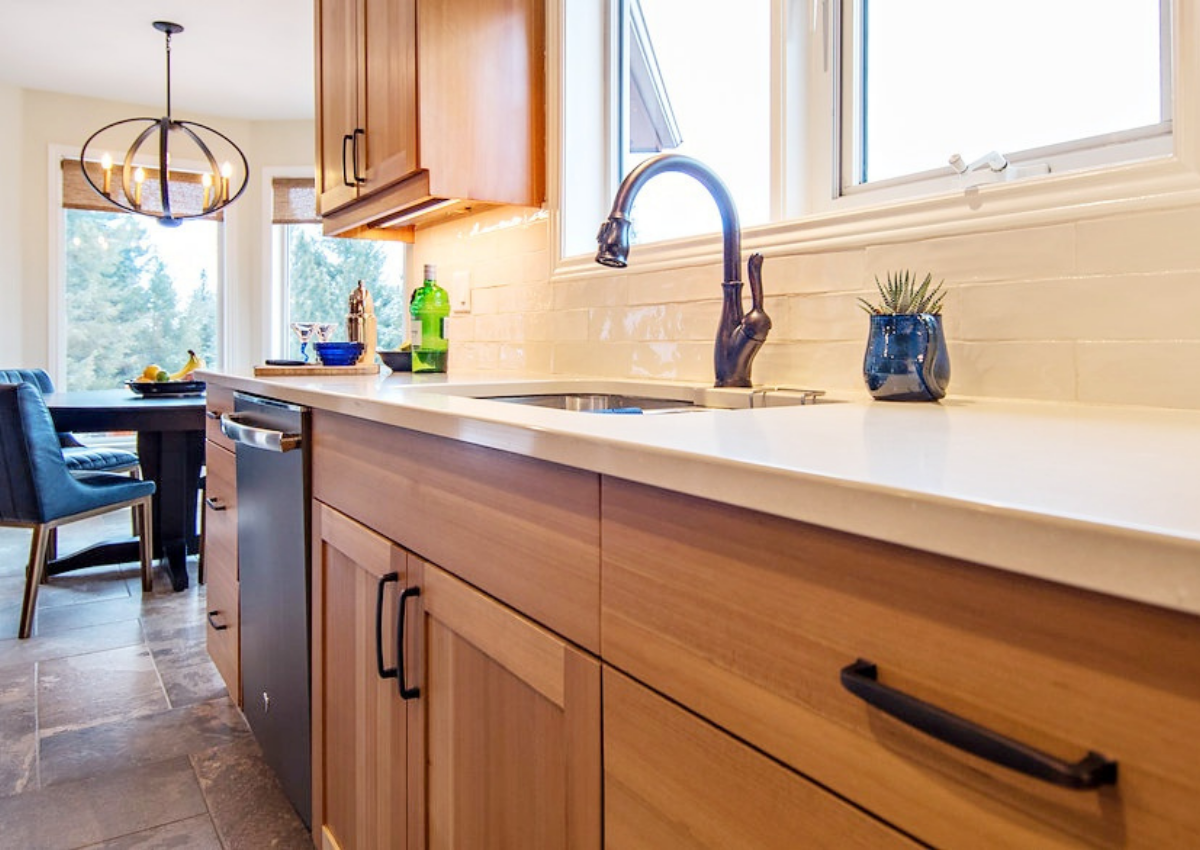Natural vs. Man-made: What are the Best Countertop Materials?
Finding the right countertop for your home is kind of like matchmaking. I have to ask all the right questions, understand preferences, and learn about your unique lifestyle. Then, I present only the best options — ones that will support your daily routine, help you fall in love with your kitchen or bathroom, and keep you happy for years to come.
However, if you’re comparing options on your own, you’ll find the decision less simple. There are a variety of countertop materials (natural and man-made), styles, functional differences, and investment levels.
To help steer you toward the best choice for your family and your space, here are some things to consider...
Natural Stone Countertop Pros and Cons
Which Countertop Materials: Granite, quartzite, marble
Natural Stone Countertop Pros & Cons:
Unique, one-of-a-kind appearance
Adds value to your home
Heatproof
Requires routine sealing & professional installation
Expensive
Not DIY friendly
What to Know: Natural stone countertops are made from naturally occuring granite, quartzite, and marble. These countertops are desirable because they have a unique appearance that can add a one-of-a-kind look to your kitchen. Natural stone countertops are durable, heatproof, and scratch-resistant.
However, while most stains can be removed from these countertops, etching can occur from acidic foods such as lemon juice or vingars and will likely be permanent. Because of this, the natural stone needs to be routinely resealed for protection. Installing a natural stone countertop isn’t for a DIYer, it needs to be done by an experienced professional.
Although these countertops are expensive, they add value to your home and can be the showpiece of your kitchen. For example...
Real Life Example: In the Lakeview project, I chose granite on the island and quartz on the perimeter. They loved the uniqueness of the granite but didn’t want it in the entire kitchen. The granite was used as more of a feature in the kitchen.
Pro Tip: If you want a countertop with lots of color and movement, I would suggest natural stone. If you are looking for a more uniform look with little to no pattern, quartz is the best choice. Which brings us to...
Man-Made Countertop Stone: Quartz
Which Countertop Material? Quartz (not to be confused with natural “quartzite”)
Pros & Cons at a Glance:
Stain-resistant
Adds value to your home
Uniform appearance
Not heatproof
Expensive
Not ideal for DIYers
What to Know: Quartz is a man-made countertop material composed of crushed quartz, resins, polymers, and pigments. The resins and polymers make quartz counters non-porous which contribute to their stain-resistant nature.
However, the same resins and polymers that make quartz counters non porous are also what have the potential to be damaged by chemicals, heat and foods like red wine, coffee, mustard etc. Food stains are more likely to be seen on lighter counters whereas chemical stains would show more on darker counters. Although stains are rare, they do happen, so I always recommend a quick wipe up sooner rather than later if these types of spills occur.
Quartz is one of the hardest minerals out there, making quartz counters very durable and scratch resistant, but quartz countertops are not heat-proof, so if you place a hot pan on the countertop it will scorch!
If you are looking to DIY a countertop, this isn’t the material for you. Quartz countertops are considered custom and require templating as part of the installation process, which means there are a few days or weeks in between templating and installation.
Important Note on Quartz in Canada
Quartz has recently surpassed granite as the most desirable countertop material… but there are no regulations in Canada when it comes to importing these products from overseas. Because of their popularity and demand, there are many companies out there that are producing lesser quality quartz products. To avoid fading and yellowing countertops, I generally advise my clients to stick to brands that are produced in North America.
Real Life Example: For the Ivy Road Project, I chose quartz counters for the perimeter because we were mixing many materials. I wanted something light and plain for the perimeter because the tile floor has a lively neutral pattern.
PRO TIP: Each product or material type has many price points. The more unique the stone, the more expensive it is.
Man-Made Countertop Stone: Dekton
Which Countertop Material? Dekton (made from quartz, porcelain, and glass)
Pros & Cons at a Glance:
Heatproof (and nearly indestructible)
Non-porous
Indoor/Outdoor use (UV/fade-resistant)
Expensive
Limited experienced installers
What to Know: Dekton is my personal favorite when it comes to countertop materials. It is man-made and is an ultra-compact product composed of quartz, porcelain, and glass. Dekton is resistant to UV rays, which means it can be used both indoors and outdoors and won’t fade in the sun.
Although Dekton can be more expensive than granite and quartz products, this heatproof, stain-resistant countertop is extremely durable. I have literally poured nail polish on a sample and lit it on fire — and there was no damage!
One downside to Dekton is that it requires different fabrication equipment than granite and quartz because it is so hard, which also means there aren’t as many fabricators and installers out there. Also, the pigments and patterns don’t run through the full thickness of the surface which means in the rare occurrence of a chip, it can be quite noticeable.
Real Life Example: My Emerald Kitchen Project clients wanted something pretty much bomb-proof. They do lots of cooking as a family and didn’t want to worry about stains, etching, or scratching. Dekton was the right choice for them.
PRO TIP: If I am designing a kitchen or bathroom and have flooring like a tile that has a lot of pattern and movement to it (like this show-stopping backsplash, above), I recommend using a stone that has little to no pattern. If the other elements in the space are plain, I will suggest a stone that is more unique.
What’s Next?
As I mentioned, it is difficult to select a clear winning countertop material without understanding your needs for your space, how you use it, your budget, and the look you’re hoping to achieve. You also know that countertops are an investment — and you want to get it right!
This is where I can help. You can book a 2-Hour Work Session to discuss the direction and best next steps for your design and renovation, including which materials are right for you. Or really take the stress off your shoulders and hire us to select your kitchen finishes or bathroom finishes from top to bottom.
P.S. Want to show off your new countertops at your next big event? Reach out now to get them completed in time!
Warmly,
Adrienne
All photos by Stephanie Moore Photography




